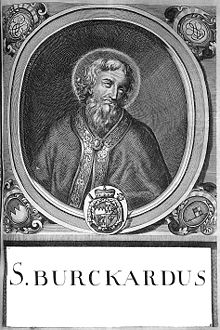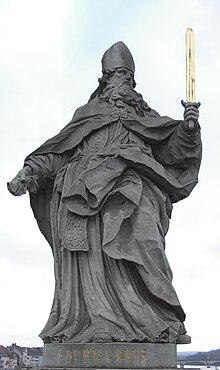Burchard of Würzburg: Difference between revisions
m Replace magic links with templates per local RfC and MediaWiki RfC |
Mannanan51 (talk | contribs) added ref, expanded, misc cl |
||
| Line 28: | Line 28: | ||
'''Burchard of Würzburg''' was a [[Bishop of Würzburg]] in 741–754. |
'''Burchard of Würzburg''' was a [[Bishop of Würzburg]] in 741–754. |
||
He was an [[Anglo-Saxons|Anglo-Saxon]] who left [[England]] after the death of his |
He was an [[Anglo-Saxons|Anglo-Saxon]] who left [[England]] after the death of his parents and joined [[Boniface]] in his missionary labors, some time after 732. When Boniface organized bishoprics in [[Middle Germany]], he placed Burchard over that of [[Würzburg]]; his consecration can not have occurred later than the summer of 741, since in the autumn of that year, we find him officiating as a bishop at the consecration of Willibald of Eichstädt.<ref name=Kirsch/> |
||
[[Pope Zachary]] confirmed the new bishopric in 743. Burchard appears again as a member of the first German council in 742, and as an envoy to Rome from Boniface in 748. With [[Saint Fulrad|Fulrad]] of [[Saint-Denis, Seine-Saint-Denis|Saint-Denis]], he brought to Zachary the famous question of [[Pippin the Younger|Pepin]], whose answer was supposed to justify the assumption of regal power by the [[Carolingians]]. |
[[Pope Zachary]] confirmed the new bishopric in 743. Burchard appears again as a member of the first German council in 742, and as an envoy to Rome from Boniface in 748. With [[Saint Fulrad|Fulrad]] of [[Saint-Denis, Seine-Saint-Denis|Saint-Denis]], he brought to Zachary the famous question of [[Pippin the Younger|Pepin]], whose answer was supposed to justify the assumption of regal power by the [[Carolingians]].<ref name=Kirsch/> |
||
In 751, he resigned his see in favor of [[Megingoz]], a Benedictine monk from St. Peter's Abbey in Fritzlar,<ref> [https://catholicsaints.info/butlers-lives-of-the-saints-saint-burckard-first-bishop-of-wurtzburg-confessor/ Fr. Alban Butler. “Saint Burckard, First Bishop of Wurtzburg, Confessor”. ''Lives of the Fathers, Martyrs, and Principal Saints'', 1866. CatholicSaints.Info. 14 October 2013. Web]</ref> and retired to a life of solitude. |
|||
His feast day is 14 October.<ref>{{cite web|url=http://www.newadvent.org/cathen/03064b.htm |title=Archived copy |accessdate=2014-11-18 |deadurl=no |archiveurl=https://web.archive.org/web/20160304120402/http://www.newadvent.org/cathen/03064b.htm |archivedate=2016-03-04 |df= }}</ref> |
|||
His feast day is 14 October.<ref name=Kirsch>[http://www.newadvent.org/cathen/03064b.htm Kirsch, Johann Peter. "St. Burchard of Würzurg." The Catholic Encyclopedia] Vol. 3. New York: Robert Appleton Company, 1908. 6 September 2017</ref> |
|||
==Literature== |
|||
| ⚫ | |||
| ⚫ | |||
{{catholic|title=St. Burchard of Würzurg}} |
|||
==Sources== |
|||
* Friedrich Wilhelm Bautz: Burchard. In: Biographisch-Bibliographisches Kirchenlexikon (BBKL). Band 1, Bautz, Hamm 1975. 2., unveränderte Auflage Hamm 1990, {{ISBN|3-88309-013-1}}, Sp. 816–817. |
* Friedrich Wilhelm Bautz: Burchard. In: Biographisch-Bibliographisches Kirchenlexikon (BBKL). Band 1, Bautz, Hamm 1975. 2., unveränderte Auflage Hamm 1990, {{ISBN|3-88309-013-1}}, Sp. 816–817. |
||
* Wilhelm Engel: Burchard. In: Neue Deutsche Biographie (NDB). Band 3, Duncker & Humblot, Berlin 1957, {{ISBN|3-428-00184-2}}, S. 29 (Digitalisat). |
* Wilhelm Engel: Burchard. In: Neue Deutsche Biographie (NDB). Band 3, Duncker & Humblot, Berlin 1957, {{ISBN|3-428-00184-2}}, S. 29 (Digitalisat). |
||
| Line 42: | Line 47: | ||
*Heinrich Wagner: Würzburger Diözesan Geschichtsblätter (WDGB). Band 65, 2003 (Die Würzburger Bischöfe 741-842), S. 17–43. |
*Heinrich Wagner: Würzburger Diözesan Geschichtsblätter (WDGB). Band 65, 2003 (Die Würzburger Bischöfe 741-842), S. 17–43. |
||
* Alfred Wendehorst: Burchard (Nr. 14). In: Lexikon des Mittelalters (LexMA). Band 2, Artemis & Winkler, München/Zürich 1983, {{ISBN|3-7608-8902-6}}, Sp. 951. |
* Alfred Wendehorst: Burchard (Nr. 14). In: Lexikon des Mittelalters (LexMA). Band 2, Artemis & Winkler, München/Zürich 1983, {{ISBN|3-7608-8902-6}}, Sp. 951. |
||
| ⚫ | |||
| ⚫ | |||
==External links== |
==External links== |
||
| Line 50: | Line 52: | ||
* http://www.santiebeati.it/dettaglio/91258 |
* http://www.santiebeati.it/dettaglio/91258 |
||
* https://web.archive.org/web/20150110042227/http://www.weyer-neustadt.de/content/DesktopDefault.aspx?tabid=180 |
* https://web.archive.org/web/20150110042227/http://www.weyer-neustadt.de/content/DesktopDefault.aspx?tabid=180 |
||
* http://fries.franconica.uni-wuerzburg.de/login/frame.php{{dead link|date=November 2016 |bot=InternetArchiveBot |fix-attempted=yes }} |
|||
* https://web.archive.org/web/20150110042227/http://www.weyer-neustadt.de/content/DesktopDefault.aspx?tabid=180 |
* https://web.archive.org/web/20150110042227/http://www.weyer-neustadt.de/content/DesktopDefault.aspx?tabid=180 |
||
* [http://franconica.uni-wuerzburg.de/ub/fries/pages/fries/73.html Burkard in the Frisian Chronicle] |
* [http://franconica.uni-wuerzburg.de/ub/fries/pages/fries/73.html Burkard in the Frisian Chronicle] |
||
* [http://www.newadvent.org/cathen/03064b.htm Biography of "St. Burchard of Wurzburg"] |
|||
* {{Germania Sacra|118817140}} |
* {{Germania Sacra|118817140}} |
||
Revision as of 21:48, 6 September 2017
Saint Burchard of Würzburg | |
|---|---|
 Engraving by Johann Salver. | |
| Born | unknown England |
| Died | c. 750 Würzburg |
| Venerated in | Roman Catholic Church Orthodox Church |
| Feast | 14/10 |

Burchard of Würzburg was a Bishop of Würzburg in 741–754.
He was an Anglo-Saxon who left England after the death of his parents and joined Boniface in his missionary labors, some time after 732. When Boniface organized bishoprics in Middle Germany, he placed Burchard over that of Würzburg; his consecration can not have occurred later than the summer of 741, since in the autumn of that year, we find him officiating as a bishop at the consecration of Willibald of Eichstädt.[1]
Pope Zachary confirmed the new bishopric in 743. Burchard appears again as a member of the first German council in 742, and as an envoy to Rome from Boniface in 748. With Fulrad of Saint-Denis, he brought to Zachary the famous question of Pepin, whose answer was supposed to justify the assumption of regal power by the Carolingians.[1]
In 751, he resigned his see in favor of Megingoz, a Benedictine monk from St. Peter's Abbey in Fritzlar,[2] and retired to a life of solitude.
His feast day is 14 October.[1]
References
- ^ a b c Kirsch, Johann Peter. "St. Burchard of Würzurg." The Catholic Encyclopedia Vol. 3. New York: Robert Appleton Company, 1908. 6 September 2017
- ^ Fr. Alban Butler. “Saint Burckard, First Bishop of Wurtzburg, Confessor”. Lives of the Fathers, Martyrs, and Principal Saints, 1866. CatholicSaints.Info. 14 October 2013. Web
![]() This article incorporates text from a publication now in the public domain: Herbermann, Charles, ed. (1913). "St. Burchard of Würzurg". Catholic Encyclopedia. New York: Robert Appleton Company.
This article incorporates text from a publication now in the public domain: Herbermann, Charles, ed. (1913). "St. Burchard of Würzurg". Catholic Encyclopedia. New York: Robert Appleton Company.
Sources
- Friedrich Wilhelm Bautz: Burchard. In: Biographisch-Bibliographisches Kirchenlexikon (BBKL). Band 1, Bautz, Hamm 1975. 2., unveränderte Auflage Hamm 1990, ISBN 3-88309-013-1, Sp. 816–817.
- Wilhelm Engel: Burchard. In: Neue Deutsche Biographie (NDB). Band 3, Duncker & Humblot, Berlin 1957, ISBN 3-428-00184-2, S. 29 (Digitalisat).
- Heinrich Hahn: Burghard. In: Allgemeine Deutsche Biographie (ADB). Band 3, Duncker & Humblot, Leipzig 1876, S. 564–566.
- Konrad Schäfer, Heinrich Schießer: Leben und Wirken des hl. Burkhard (= Bad Neustädter Beiträge zur Geschichte und Heimatkunde Frankens. Band 4). Bad Neustadt a. d. Saale 1986, ISBN 978-3-9800482-4-8.
- Heinrich Wagner: Würzburger Diözesan Geschichtsblätter (WDGB). Band 65, 2003 (Die Würzburger Bischöfe 741-842), S. 17–43.
- Alfred Wendehorst: Burchard (Nr. 14). In: Lexikon des Mittelalters (LexMA). Band 2, Artemis & Winkler, München/Zürich 1983, ISBN 3-7608-8902-6, Sp. 951.
External links
- http://www.santiebeati.it/dettaglio/91258
- https://web.archive.org/web/20150110042227/http://www.weyer-neustadt.de/content/DesktopDefault.aspx?tabid=180
- https://web.archive.org/web/20150110042227/http://www.weyer-neustadt.de/content/DesktopDefault.aspx?tabid=180
- Burkard in the Frisian Chronicle
- "Burchard of Würzburg". Germania Sacra people index (in German). Göttingen Academy of Sciences and Humanities.
![]() This article incorporates text from a publication in the public domain: Jackson, Samuel Macauley, ed. (1914). New Schaff–Herzog Encyclopedia of Religious Knowledge (third ed.). London and New York: Funk and Wagnalls.
This article incorporates text from a publication in the public domain: Jackson, Samuel Macauley, ed. (1914). New Schaff–Herzog Encyclopedia of Religious Knowledge (third ed.). London and New York: Funk and Wagnalls. {{cite encyclopedia}}: Missing or empty |title= (help)
